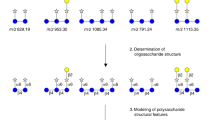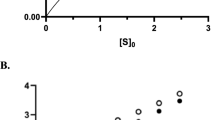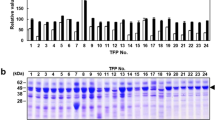Abstract
HEHRE1, working with the enzyme dextransucrase, showed that a plot of initial velocity v against substrate concentration deviated from linearity above a sucrose concentration of 200 mM. This was tentatively explained on the basis of a decrease in concentration of water in the stronger sucrose solutions.
This is a preview of subscription content, access via your institution
Access options
Subscribe to this journal
Receive 51 print issues and online access
$199.00 per year
only $3.90 per issue
Buy this article
- Purchase on Springer Link
- Instant access to full article PDF
Prices may be subject to local taxes which are calculated during checkout
Similar content being viewed by others

References
Hehre, E. J., J. Biol. Chem., 163, 221 (1946).
Neely, W. B., J. Amer. Chem. Soc., 80, 2010 (1958).
Somogyi, M., J. Biol. Chem., 160, 61 (1945).
Nelson, N., J. Biol. Chem., 153, 375 (1944).
Bray, H. G., and White, K., “Kinetics and Thermodynamics in Biochemistry”, 227 (Academic Press, Inc., New York, 1957).
Author information
Authors and Affiliations
Rights and permissions
About this article
Cite this article
NEELY, W. Inhibition of Dextransucrase by Excess Substrate. Nature 182, 1007–1008 (1958). https://doi.org/10.1038/1821007a0
Issue Date:
DOI: https://doi.org/10.1038/1821007a0
This article is cited by
Comments
By submitting a comment you agree to abide by our Terms and Community Guidelines. If you find something abusive or that does not comply with our terms or guidelines please flag it as inappropriate.


